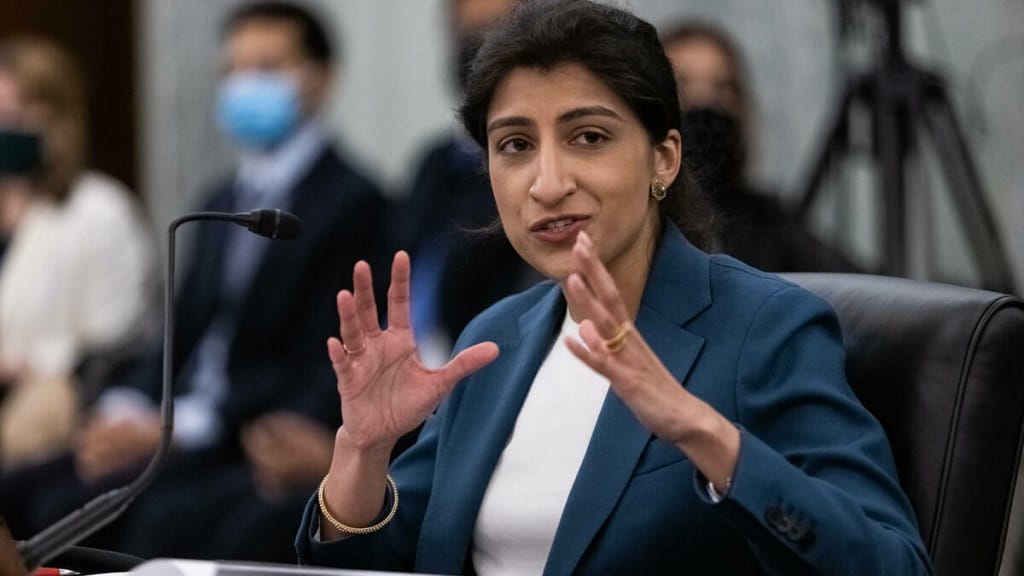Washington’s Antitrust Push Could Create ‘Chilling Effect’ on Startups, Observers Say
There is concern that an FTC focused on ‘big is bad’ will stunt economic growth in the future.
Ahmad Hathout

WASHINGTON, September 23, 2021 – Advocates for less government encroachment on big technology companies are warning that antitrust is being weaponized for political ends that may end up placing a “chilling effect” on innovative businesses.
The Institute for Policy Innovation held a web event Wednesday to discuss antitrust and the modern economy. Panelists noted their concern that antitrust law may be welded with political aims that will ultimately create a precedent whereby the federal government will stifle innovators who get too big.
Jessica Melugin, the director of the Center for Technology and Innovation, said technology companies could see what’s happening in Washington – with lots of talk of breaking up companies deemed too big – and be uncertain of the future.
She noted that growing companies largely seek one of two things to make it big: grow to file an initial public offering, where the company’s shares are publicly traded, or wait until a large company buys you out. She said talk emanating from the White House and Washington generally about regulating the industry could deter larger companies from acquiring them, and onerous financial regulations could put a damper on IPO dreams.
“If you start robbing companies of other smaller companies they purchased, it’s going to give a lot of entrepreneurs and a lot of funders in Silicon Valley pause,” Melugin said. “If another path to success gets blocked – the IPO is now harder, and now acquisitions are a little bit questionable…that’s a chilling effect.”
President Joe Biden has made a number of appointments to key positions that is bringing more attention on Big Tech, including known Amazon critic Lina Khan to chair the Federal Trade Commission, which recently filed an amended case against Facebook for alleged anticompetitive practices. He also appointed antitrust expert and Google critic Jonathan Kanter as assistant attorney general in the Justice Department’s antitrust division.
FTC could set a bad precedent if focus is ‘big is bad’
Christopher Koopman, the executive director at the Center for Growth and Opportunity at Utah State University, said he’s concerned about the precedent Khan could set for big companies.
He said the odds are that once Khan starts, she will continue down “this path of ‘big is bad’ because that’s a prior that she has and she’s continued to operate on her entire professional career. It just so happens that the focus of this is on tech companies.
“We may be building a regulatory apparatus that will continue to burrow a hole right down the middle of the American economy before we even have a chance to ask if that’s really what we want,” Koopman added. “We just have to recognize that it doesn’t matter, really, who is running the FTC – once we tell the FTC to go break up big companies, they’re going to go break up big companies.”
And the concern for Carl Szabo, vice president and general counsel of lobby group NetChoice, which advocates for less government regulation on the future of technology, is not just a domestic problem, but an international one, too.
“I really do worry about us shanking our innovation and essentially giving a free kick to our competitors and that seems to be what we’re doing,” Szabo said. “Right now, we lead the world.
“This is an international issue, this is a national issue, and we really need to – whether Conservative or Democrat – as Americans we need to see the forest from the trees. And if we want to put corporations ahead of competitors and think those are good democratic values, go ahead and do it.
The House has before it six antitrust bills targeting big technology companies, which passed the chamber’s judiciary committee in June. The goal of the bills is to rein in the power of Big Tech through new antitrust liability provisions, including new merger and acquisition review, measures to prevent anticompetitive activity, and providing government enforcers more power to break-up or separate big businesses.
Federal Communications Commissioner Brendan Carr said earlier this year that Big Tech has too much influence and power, citing the ability of Apple and Google to remove applications like controversial chat website Parler from its app stores. Carr recently recommended that Big Tech contribute to the Universal Service Fund, which supports broadband expansion in low-income and rural areas of the country, because these companies benefit from broadband.









Member discussion